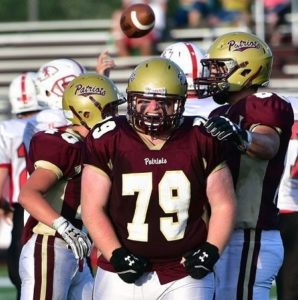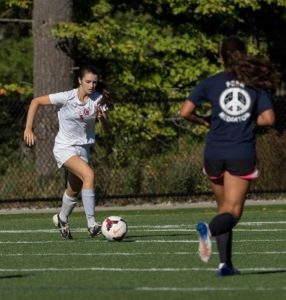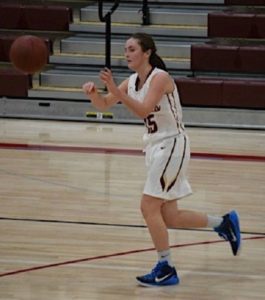Should kids be asked to choose between their love of music or sports?
Absolutely not, and we have four excellent examples to support our answer. Four former CCM students managed to pursue both music and sports at a high level of performance, while also getting themselves successfully through high school. They exemplify why there’s no need to make kids choose between learning to be musicians and playing sports.
As they had approached their last few months before graduating, we asked them to reflect on how they did it all. Their experiences demonstrate that, although music and sports can compete for a student’s time, they can also be complementary pursuits. At CCM and in their school groups, these musicians learned about goal setting, discipline, and practice—all of which served them well on the soccer pitch, the football field, the basketball court, or the fencing strip.
JOSH ALLEN
Instrument: Baritone Saxophone 
Sport: Football
There’s a high correlation between sports and music in terms of having the mental fortitude to push forward. Playing football, you need a lot of physical and mental strength, while also being smart and light on your feet. There are many plays and formations to learn, just like there are many notes to learn on the staff and a few different ways to play some of those notes.
For both football and my specific instrument, I also need a great deal of lung capacity: After playing football for four years and baritone saxophone for six, my lung capacity had certainly increased. As for juggling schedules, I would often be running from place to place, especially with other extra-curricular activities. I barely had time to eat and do homework, especially in my sophomore and junior years.
There were always conflicts with concerts, practices and rehearsals, but we made it work. That’s what we do as both musicians and athletes.
CLAIRE DETTELBACH
Instruments: Alto Saxophone, Piano 
Sports: Soccer, Fencing
I took alto saxophone lessons with Carlos Averhoff Jr., and piano lessons with Yelena Beriyeva. I also played the alto saxophone for my high school concert band, and I played piano for my high school jazz band and pit orchestra. I played soccer since elementary school, and was on the varsity team. I also was on the women’s varsity fencing team.
Sports and music overlap in two main areas: confidence and discipline. Although I had done it for more than 12 years, performing at recitals still made me nervous, no matter how long I had been preparing a certain piece. Sports, too, demand a similar sort of self-assurance: Especially in individual sports, it takes a lot of confidence and a couple of deep breaths to step out onto the strip with your entire team watching you.
Having a background in music made it easier for me to tune out the distractions and focus while on the fencing strip or the soccer field. Music taught me that in order for practicing to become fruitful and even fun, you have to be invested in it for yourself, not just for your teacher.
When I was younger, piano practicing was a real chore. Somewhere along the line though, it became rewarding, and I began practicing with the knowledge that everything is more fun when you’re good at it. With fencing and soccer, too, practice makes it more fun.
Many people quit music in high school because they think they don’t have the time for it, but music can actually be a huge stress-reliever. Even just half an hour of piano at night after homework, whether I’m practicing or playing random pieces for fun, lets me wind down from busy high school days.
ZOE DETTELBACH
Instrument: Clarinet 
Sports: Soccer, Basketball
I played soccer and basketball through all four years of high school. I was the captain of the women’s basketball team my last season. At CCM, I studied the clarinet with Liz Leehey, and I also played clarinet for the Concord-Carlisle High School concert band. It has been great to have the balance of sports and music in my life.
High school students can be stressed from school work and planning for the future, and for me, music has been an incredible way to alleviate stress, in the same way that sports can. Having band during the school day means that, for an hour, I was able to put down my pencil and paper or computer and just focus on making music. It allowed me to relax and express myself through my instrument with a group of my peers. It’s an entirely different environment than the classroom, which is one of the things I loved about it.
Sports alleviates stress for me, too, through competition; while band does so through working with others to make music. I can’t imagine my high school years without them, and I intend to continue my involvement with both.
LYDIA YODER
Instrument: Cello 
Sport: Nordic Skiing
I played the cello for 13 years and have been cross-country skiing for about eleven years. I learned cello first, and the rhythm really helped my coordination and technique with skiing because it relies largely on timing. Skiing, in turn, made me a much more organized person because I had to manage my workouts with school and cello. It forced me to stay organized and think about what I needed and wanted to get done during my day.
I was the captain of the cross-country ski team at my high school, and the leadership skills I have developed from that helped me take a leadership role in music groups and mentoring programs. Balancing both athletics and music can be a logistical nightmare at times, but the trouble is well worth the enjoyment I get from both activities.
Obviously music makes us healthier and happier so why not learn an instrument today—even if you also play a sport. Discover your options at CCM!
Back To Top